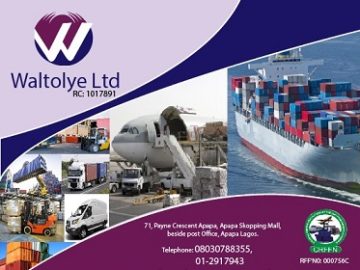…. Recommends Independent Power Distributors To Marine /Blue Economy Minister For Port Concessionaires
A maritime lawyer , Barrister Osuala Nwagbara has expressed concerns over the high cost of diesel to power the ports by the concessionaires, even as he estimated a whooping N100 billion annual lost by the investors
The Legal consultant who disclosed this to DAILYFOCUS NIGERIA over the weekend , recommended to the Minister of Marine and Blue Economy to optimize Nigerian ports efficiency with innovations on power supply arrangement.
He lamented that each of these terminal operators in Lagos – comprising Tin Can Island Port and Lagos Ports Complex use up to 800 litres of diesel daily stressing that such estimation alone could cost an approximate N50billion annually.
He added that out ports terminal operators in Onne , Calabar , Warri, Port Harcourt port supposedly record such humongous figure when calculated, while maintaining that the cost of doing business at the nation’s seaports is relatively high.
Nwagbara lamented that Nigerian ports remain the most expensive in the world and lack of power supply is a major factor militating against pricing and other charges associated with cargo clearance.
According to a letter dated 26 February 2024 and addressed the the Federal Government through the Minister of Marine/Blue Economy, by the lawyer, a copy made available to DAILYFOCUS NIGERIA reiterated that one of the intractable problems of the Nigerian ports is power supply .
Nwagbara who affirmed that the problem of electricity has been in existence even before the commercialization of the nation’s seaports added that the arrangement that saw the ceding of cargo handling operations to private investors through the concessioning arrangement of 2005/2006 has continued to linger till date.
Determined to proffer lasting solutions to power outage in the port communities in Nigeria, the maritime lawyer urged the pioneer Minister of Marine/Blue Economy to issue licenses to reputable operators in the power industry pointing out that with permit granted to Electricity Regulatory Commission, the service provider would help reduce the cost of doing business in the ports.
“Since the issue of power appears intractable, it is humbly suggested that as the shorter tenure of the port concession/lease agreements draws to a close, the Nigerian government should providers into possible renewal of factor independent power
Concession/lease agreements.
” This would mean that an independent power
company builds a power plant using the best available technology for power by Nigerian generation to serve the port areas in Nigeria.
“This is one of the reasons the Nigerian Ports costs are the highest in West Africa. It is not the case that the issue of power and its impact on the operations of the Nigerian Ports and the Port area Communities is not known.
The maritime lawyer noted that ” What is true, is that Nigerian institutions place individual interests over and above public interests. When one takes into account the Nigerian Ports Authority facilities within a given port complex across the country. the number of terminals within the Port, plus the off-dock terminals within the port area communities and environs, and adds up the cost of power used by each facility and each operator, certainly the cost is gargantuan.
As long ago as 2016″
He further re-echoed that seaports all over the world contribute substantially to the GDP of littoral states.Nigeria is not an exception in this regard. For ports to be in position to make such contribution, such ports must be efficient in service delivery, cost friendly, safe
and secure, predictable in terms of logistics and planning. and must be
accessible.
The letter addressed to the Minister further the explained that “The sea port is a gateway to international trade and a critical asset of any littoral state, We shall be writing to you from time to time on specific recommendations for the development of the Nigeria’s marine and blue economy.
” And we shall address our recommendations on the various frontiers of the Nigerian marine
and blue economy. In this letter, we shall make a short recommendation on the
optimization of the Nigerian Ports.
“From recent events, it is clear that one of the intractable problems of the Nigerian Ports is Power. This problem has been there even before the commercialization of the Nigerian Ports, the arrangement that saw the ceding of cargo handling operations to private entrepreneurs through the concessioning arrangement of 2005/2006. The problem has continued till date,” the lawyer advised.

















